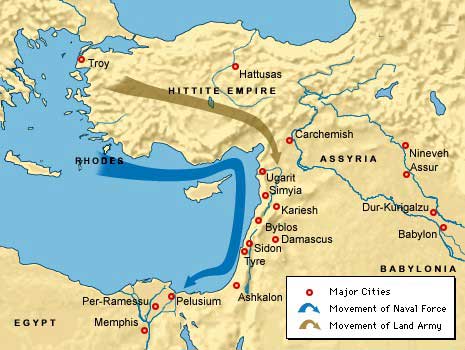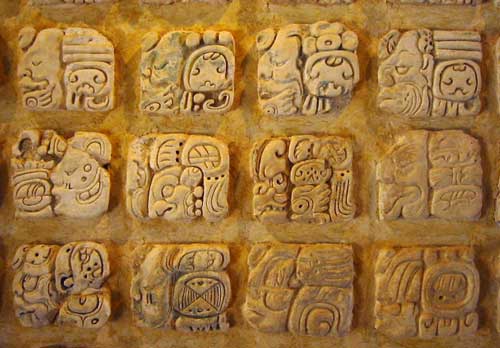 Socrates now proceeds to cross examine his formal accuser, Meletus. He uses his classic method of examination, the elenchus, which is concerned with two points: the first with regard to Meletus’ lack of concern for the upbringing of young men, and the second with regard to his accusation that Socrates doesn’t believe in any gods.
Socrates now proceeds to cross examine his formal accuser, Meletus. He uses his classic method of examination, the elenchus, which is concerned with two points: the first with regard to Meletus’ lack of concern for the upbringing of young men, and the second with regard to his accusation that Socrates doesn’t believe in any gods.Concerning the first point, Socrates makes two arguments against Meletus. The first is from analogy. He first makes Meletus admit that everyone in the city has a refining effect upon young men and it is only Socrates that has a perverse impact. This, however, seems counterintuitive to Socrates. The analogy of raising horses is used; it is not the case that the whole of mankind has an improving effect upon horses and only one person has a negative effect on them, for only a select few individuals are able to raise horses properly and the rest of the population presumably has a somewhat negative effect on them, not knowing how to raise them properly. Thus, from analogy, it would be strange if only one person had a negative effect on young men (i.e. Socrates) and the rest of the population had a good effect on them. According to Socrates, this proves that Meletus has little knowledge of the upbringing of the young, which is one of the issues Meletus raised against Socrates. In essence, Socrates is arguing that Meletus had no idea what he was talking about when he charged Socrates with corrupting the youth.
The second argument isn’t laid out terribly well in the dialogue; one has to do a bit of work to bring it out. Socrates first establishes, through his elenchus method, a rather obvious point: that wicked people harm those with whom they are in close contact. Then, Socrates has Meletus state that he (Meletus) is charging Socrates with corrupting the youth intentionally. It is this point that the argument hinges on. It makes no sense, from Socrates’ point of view, to intentionally corrupt those around him for, by premise one, these people would then have a negative effect on him. Socrates states that, “am I so hopelessly ignorant as not even to realize that by spoiling the character of one of my companions I shall run the risk of getting some harm from him?” In other words, since Socrates isn’t stupid, he wouldn’t intentionally harm people because he could possibly incur some negative effects from them. Thus, if he did corrupt some youths, he must have done so unintentionally, in which case the proper course of action is not to bring him to court, but to “take him aside privately for instruction and reproof....”
Socrates now moves to the second point: the charge that he doesn’t believe in any gods. This argument, in my view, is rather dubious; I think the terms shift from the formal indictment that Socrates reads to the actual charge he argues against.
Meletus is made to say that Socrates “[disbelieves] in the gods altogether”. This can mean two things: (1) That Socrates doesn’t believe in any gods at all (i.e. he’s a complete atheist); and (2) That Socrates doesn’t believe in the gods sanctioned by the state (i.e. he believes in gods other than the ones in the Greek pantheon). If we go back to the “formal indictment” that Socrates read (see 24c), it states that he is charged with ‘believing in supernatural things of his own invention instead of the gods recognized by the state”. Thus, by Socrates’ own admission, he is charged with the second of the two meanings. However, Meletus then admits that Socrates is being charged with atheism, not just with believing in gods other than those sanctioned by the state (see 26b-26d). The charge, it seems, has switched from the second meaning to the first!

Thus, Socrates’ argument supposes that he is being charged under the first meaning, namely that he is a complete atheist, even though he read out that he was charged under the second meaning. Socrates once again argues from analogy. He begins by stating the fact that it is not the case that one can believe in musicians but not musical matters, or horses, but not believe in equine matters. By analogy, it doesn’t make sense to say that one can believe in supernatural matters but not in supernatural beings. Since Meletus then agrees that supernatural beings are either the gods or children of the gods, Socrates then must believe in the gods.
I think there is certainly something a bit shifty going on here: which meaning of the charge is Socrates being indicted under? One possibility is that there is actually something shifty going on that Plato hopes we don’t notice. A second is that the two meanings, in some sense, collapse into each other. It could be the case that atheism, for the Greeks, entails believing in gods other than those sanctioned by the state. I’m not sure how to call this; a rather pantheon-o-centric view, perhaps. This, however, could not be it, for two reasons. First, Socrates blatantly separates the two meanings in 26c, and Meletus chooses complete atheism as the one Socrates is charged under. Moreover, from a historical standpoint, the Greeks recognized other civilizations as being “religious” even though they didn’t believe in the gods of the Greek pantheon. A third possibility is that Socrates initially read out the charge wrong, and then, through questioning of Meletus, received further clarification as to the real nature of the charge. This is perhaps the most sympathetic reading. In my view, it is either the third or the first possibilities that make the most sense. I’m not entirely sure which is right.
I’ll skip over 28a to 30b rather arbitrarily. Basically Socrates is saying that he’s not afraid to die and that he is fully conscious of his ignorance, as opposed to others than claim to know things but it turns out, on the basis of Socrates’ questioning, that they really do not. Also, he puts his obligation to Apollo ahead of his supposed obligation to the city to stop philosophizing. I suppose he’s trying to buttress his claim that he’s not an atheist.
Starting in 30c, Socrates gives a rather egotistical argument: he should not be found guilty because he is a benefaction to the city; he states “if you put me to death, you will not easily find anyone to take my place”. He goes on to claim that it was God who “assigned” him to the city of Athens, which, like a horse “needs the stimulation of some stinging fly.” Socrates was sent by God to perform the function of the fly. Socrates, I think, is assuming a great deal here. First, I doubt horses like the “stimulation” of flies; getting a chunk of flesh taken out of you by a horse fly, while it certainly would be stimulating, would not be the most pleasant or the most beneficial experience to have. The only thing it would teach you is that flies should be avoided or done away with. Socrates could perhaps have found a better analogy.
“I am subject to a divine or supernatural experience....It began in my early childhood--a sort of voice which comes to me; and when it comes it always dissuades me from what I am proposing to do, and never urges me on. It is this that debars me from entering public life...” Was Socrates a schizophrenic? At any rate, this is his argument for never engaging in public affairs to any great degree. I wouldn’t want someone with a voice in their head telling them things having a hand in ruling the city either. His next point would have also made him unpopular with the judges; he states, “the true champion of justice...must necessarily confine himself to private life and leave politics alone”. In a rather democratic court, in which the judges are probably politicians, this would be an unpopular position. He goes on to make a better point with regard to the only office he ever held, the Council, in which he voted against a measure that was later found to be illegal. At the time of voting, it was presumably a popular one, as Socrates relates that there was much opposition to his vote. However, in the interest of justice, he voted against the illegal measure. Here he’s trying to show that he’s a good citizen and, consequently, would not and could not corrupt the youth: he’s a just man.

Skipping over 33a to 34b, and moving on to 34c, Socrates starts condemning the procedures of the Athenian courts. Remember at the beginning how Socrates stated that he wasn’t a good speaker? This is why. It’s generally not a good plan to rile against the court practices in which you are defending your right to live. He states that he shall forgo the usual practice of making a sob story to the judges, and does so on three grounds: it would be dishonorable, it would be inviting justice, and it would be impious. His basic position is that “it is [not] just for a man to appeal to the jury or to get himself acquitted by doing so; he ought to inform them of the facts and convince them by argument.” This, I think, is a fair point: the judges ought to stick to the facts when rendering a decision. Though, one could not say the same for Socrates: he has a habit of rambling and speaking of things that don’t directly relate to the matters at hand.
I'll deal with the "guilty" verdict in a third post.













